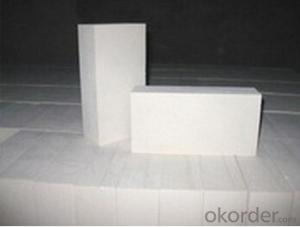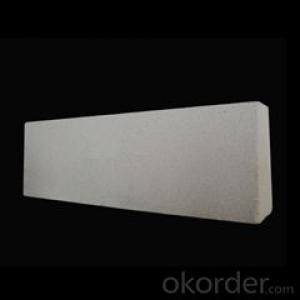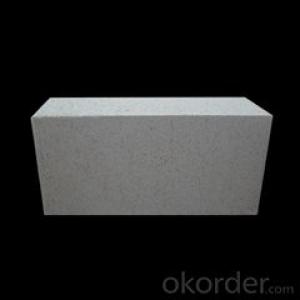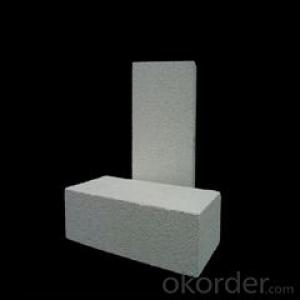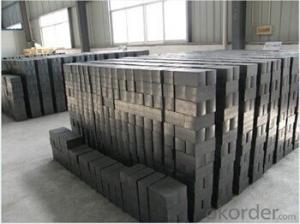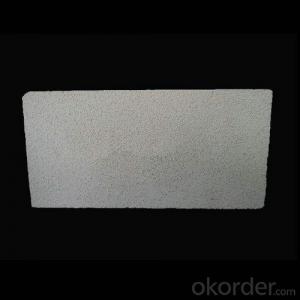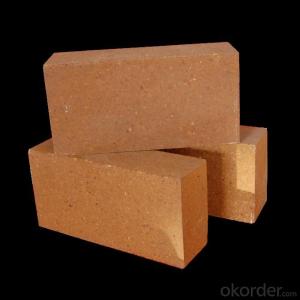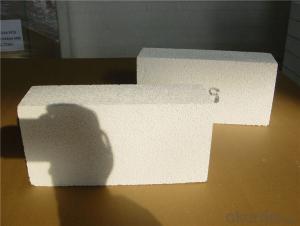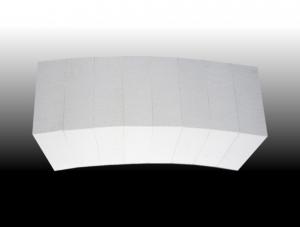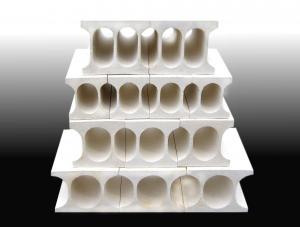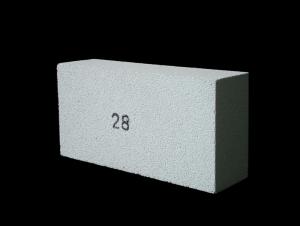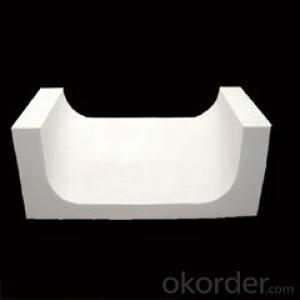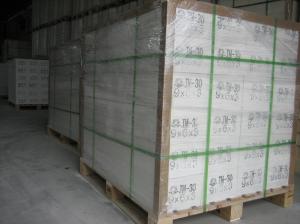Refractory mullite insulating refractory brick JM 93
- Loading Port:
- Shanghai
- Payment Terms:
- TT OR LC
- Min Order Qty:
- 5000 kg
- Supply Capability:
- 10000 kg/month
OKorder Service Pledge
OKorder Financial Service
You Might Also Like
Refractory mullite insulating refractory brick JM 23
Okorder series heat insulation brick
Okorder series thermal insulation brick is an effective, energy saving, low carbon, environmental protection advanced, according to the ASTM standard manufacturing products. Okorder series products are best Li Ning and insulation in all types of industrial furnaces in the metallurgical field, aluminum, petrochemical, electric power and glass ceramic materials. They can be used as part of the working layer of thermal insulation or non - melting. Products have been widely used in the following furnace, achieved satisfactory results.
Application of heat preservation brick
Metallurgical Industry: blast furnace, hot blast furnace, heating furnace, etc..
Petrochemical Industry: ethylene cracking furnace, hydrogen production furnace, primary reformer, heating furnace, etc..
Ceramic industry: roller kiln, kiln, etc..
Glass industry: glass furnace regenerator, etc.
Carbon industry: carbon furnace, etc..
Aluminum electrolysis industry: aluminum reduction cell, etc.
Other industries: tunnel kiln, shuttle kiln, etc..
Advantages of heat insulation brick
Low thermal conductivity: more porosity will bring good thermal insulation effect, energy saving.
High crushing strength: high crushing strength, volume stability.
Low heat storage: small heat storage to absorb more heat, energy-saving effect is obvious.
Gao Chundu: iron, alkali metal impurity content is low.
The precise size: Brick size processing precision, special shape cutting and grinding, accelerate the brickwork.
Insulating brick picture
Common problem solutions
1. What products do you have?
We have all kinds of refractory bricks, refractory casting materials, mortar, cement, ceramic fiber products, etc..
Or you can browse our products to choose what you need.
2. How to control product quality?
With strict quality control system throughout the material selection and production process, we have the quality of refractory materials and ceramic fiber products to meet customer requirements.
From the selection of raw materials, the quality of our control to start. The quality certificate of the raw material is required, each batch of the products are to be tested in the use of the forward line. In the production process, the quality control by the workers, and then each piece of classification, and through the quality supervision and inspection.
3. Can you give me a brief introduction to the application of your product?
My company is mainly engaged in refractories in the steel, cement, glass, ceramics, petrochemical, electric power and other industries.
4. What information do you need if I need you?
In order to select the right products, we will provide us with information, such as the United States, technical data, order quantity, product application, etc..
If you have any questions, please contact us.
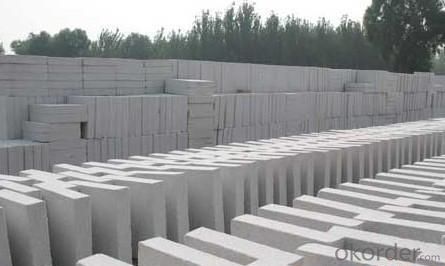
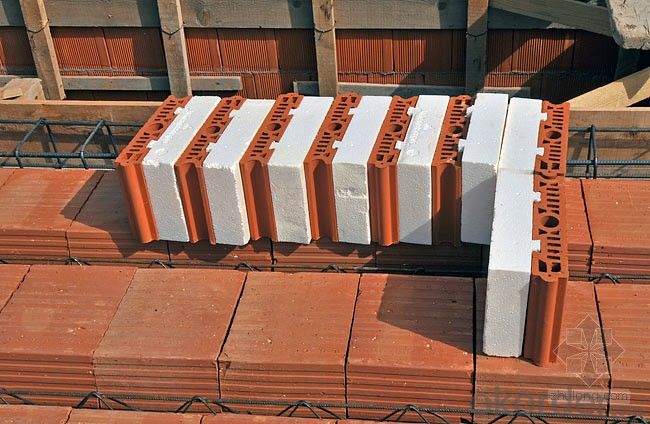
- Q:Are insulating fire bricks suitable for thermal insulation in boilers?
- Yes, insulating fire bricks are suitable for thermal insulation in boilers. Insulating fire bricks are specifically designed to have high insulating properties, which allows them to effectively reduce heat transfer in high-temperature environments such as boilers. These bricks are made from lightweight materials and have low thermal conductivity, making them ideal for thermal insulation applications. The use of insulating fire bricks in boilers can help improve energy efficiency by reducing heat loss and ensuring that the heat generated by the boiler is effectively utilized. Additionally, these bricks are resistant to high temperatures and can withstand the harsh conditions inside a boiler, making them a reliable choice for thermal insulation.
- Q:Are insulating fire bricks suitable for use in the construction of blast furnaces?
- Insulating fire bricks, crafted from lightweight materials like ceramics, prove to be a suitable option for blast furnace construction. These bricks possess remarkable insulating properties and exhibit low thermal conductivity. This quality aids in minimizing heat loss and optimizing efficiency within the blast furnace. Moreover, insulating fire bricks boast exceptional resistance to thermal shock, allowing them to endure sudden temperature fluctuations without any cracks or breaks. This attribute is vital in blast furnace construction, considering the intense heat that can rapidly deteriorate traditional bricks. Additionally, insulating fire bricks display high compressive strength, guaranteeing their durability and longevity amidst the harsh conditions of a blast furnace. In conclusion, incorporating insulating fire bricks in blast furnace construction not only enhances energy efficiency but also elevates furnace performance, ultimately extending its lifespan.
- Q:What are the main components of insulating fire bricks?
- Insulating fire bricks usually consist of a blend of alumina, silica, and assorted lightweight additives. Alumina (Al2O3) is crucial in insulating fire bricks due to its ability to withstand high temperatures and resist thermal shock. Silica (SiO2) contributes to improving the refractory qualities and insulation abilities of the bricks. Furthermore, vermiculite or perlite, which are lightweight additives, are commonly incorporated to enhance the insulating properties of the bricks. The collaboration of these components produces a material that possesses exceptional thermal insulation, minimal thermal conductivity, and remarkable heat resistance.
- Q:Can insulating fire bricks be used in the construction of glass melting tanks?
- Yes, insulating fire bricks can be used in the construction of glass melting tanks. These bricks are designed to withstand high temperatures and provide excellent thermal insulation, making them suitable for applications such as glass melting tanks where maintaining consistent and controlled heat is crucial.
- Q:Can insulating fire bricks be used in refractory castings?
- Yes, insulating fire bricks can be used in refractory castings. Insulating fire bricks are lightweight and have high insulating properties, making them suitable for applications that require thermal insulation. This includes refractory castings, which are used to create linings in furnaces, kilns, and other high-temperature equipment. The insulating fire bricks can be used as a layer or as a part of the refractory casting mix to provide thermal insulation and reduce heat loss. Additionally, their low thermal conductivity helps in minimizing energy consumption and maintaining high temperatures within the casting.
- Q:Are insulating fire bricks resistant to saltwater?
- No, insulating fire bricks are not resistant to saltwater.
- Q:Can insulating fire bricks be used in paper mills?
- Yes, insulating fire bricks can be used in paper mills. Insulating fire bricks are commonly used in industrial applications, including paper mills, to provide thermal insulation and protect equipment from high temperatures. They help in maintaining optimal temperature levels and enhance energy efficiency in the paper production process.
- Q:Are insulating fire bricks resistant to chemical attack?
- Yes, insulating fire bricks are generally resistant to chemical attack. They are designed to withstand high temperatures and are made from materials that are chemically inert, making them suitable for various industrial applications where exposure to chemicals is a concern. However, the specific resistance may vary depending on the type of chemical and concentration, so it is important to consider the specific chemical environment when selecting insulating fire bricks.
- Q:Can insulating fire bricks be used in rocket stove designs?
- Insulating fire bricks are capable of being incorporated into the designs of rocket stoves. Rocket stoves are renowned for their efficient combustion and heat transmission, and the utilization of insulating fire bricks can enhance this level of performance. These bricks are produced from lightweight materials that possess excellent insulating properties, allowing them to effectively retain and reflect heat. The combustion chamber of a rocket stove is typically lined with insulating fire bricks in order to maximize the transfer of heat to the cooking surface or the area being heated. The bricks aid in the retention of heat within the combustion chamber, ensuring that a greater portion of the energy generated from the burning fuel is utilized to heat the cooking surface, rather than being dissipated into the surrounding environment. Moreover, insulating fire bricks are capable of enduring high temperatures, making them an ideal choice for inclusion in rocket stove designs. They are specifically engineered to withstand the intense heat generated by the combustion process, guaranteeing that the bricks will not fracture or shatter under such circumstances. In conclusion, the incorporation of insulating fire bricks into the designs of rocket stoves can enhance the efficiency and heat transmission of the stove, resulting in a more efficient and sustainable solution for cooking or heating purposes.
- Q:Are insulating fire bricks suitable for use in steel mills?
- Yes, insulating fire bricks are suitable for use in steel mills. Insulating fire bricks have high temperature resistance and excellent thermal insulation properties, making them ideal for lining furnaces and kilns in steel mills. They help to maintain high temperatures while minimizing heat loss, resulting in energy efficiency and cost savings. Additionally, insulating fire bricks also provide protection against thermal shock and chemical corrosion, enhancing the overall durability and longevity of steel mill equipment.
1. Manufacturer Overview |
|
|---|---|
| Location | |
| Year Established | |
| Annual Output Value | |
| Main Markets | |
| Company Certifications | |
2. Manufacturer Certificates |
|
|---|---|
| a) Certification Name | |
| Range | |
| Reference | |
| Validity Period | |
3. Manufacturer Capability |
|
|---|---|
| a)Trade Capacity | |
| Nearest Port | |
| Export Percentage | |
| No.of Employees in Trade Department | |
| Language Spoken: | |
| b)Factory Information | |
| Factory Size: | |
| No. of Production Lines | |
| Contract Manufacturing | |
| Product Price Range | |
Send your message to us
Refractory mullite insulating refractory brick JM 93
- Loading Port:
- Shanghai
- Payment Terms:
- TT OR LC
- Min Order Qty:
- 5000 kg
- Supply Capability:
- 10000 kg/month
OKorder Service Pledge
OKorder Financial Service
Similar products
New products
Hot products
Related keywords
